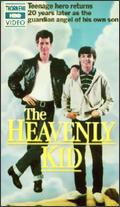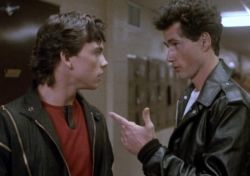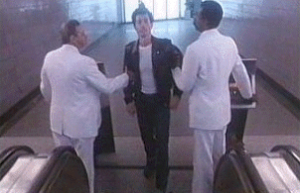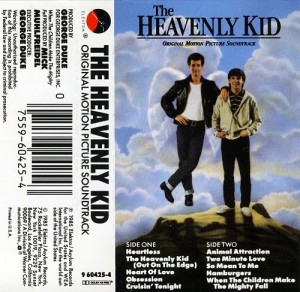Well, this is the first “official” review for Forgotten Flix, and it seems fitting. The Heavenly Kid was one of those movies my sister and I watched over and over and over and… well, you get the idea. It was insane how many times we watched Bobby save Lenny from the perils of nerdom (something I take quite an offense to now).
Oh, and for those who actually read the “Pre-review” post from a few days ago, all the questions I said I’d answer? Yeah. Not really. Although, I am still wondering why the hell so many 80s comedies have a scene where a character “mistakenly” goes into a gay bar…
Warning! This video contains spoilers and the awesome John Fiore song “Out On the Edge”!
How I remember it…
I was nine when The Heavenly Kid opened in theaters. I didn’t know it existed. I was too busy counting my Garbage Pail Kids cards and gettin’ my butt whooped playing Uno to notice. No, it wasn’t until it showed up at the video store that it entered my life. Now, I’m not 100% on this, but the way I remember it, my dad took Angie (my sister) and me to the video store (not sure if it was the Armchair Theater video store or not, but it was definitely a mom and pop shop).
I don’t remember picking out the movie, but I can remember the box for Ghoulies out of reach on the “New Releases” wall, that bald, green ghoul with its mocking grin popping out of the commode. So, we rented The Heavenly Kid and my sister and I spent 97 minutes that night caught up in a movie that would have really pissed Mom off had she known we were watching it. It was PG-13, back when that was a big deal. It was forbidden fruit and we LOVED it! It was hilarious. It was fun. It felt edgy and risky. Well, to us anyway. Of course, we thought we were living on the edge when we’d knock on somebody’s door and run, or go dumpster diving at the Federal Discount store next door, so… consider the source.
Watching it now…
Janet Maslin said in her July 26, 1985 New York Times review of The Heavenly Kid thus: “GUARDIAN angel movies almost always have a little charm, but ”The Heavenly Kid” has none.” I say bull pucky. Sure, a seasoned film critic like Maslin would have dismissed The Heavenly Kid as pedestrian tripe. But, you see, she and other critics couldn’t see its potential as a mid-80s Pygmalion with a pseudo-spiritual twist.
That’s because they were grown-ups, driven cynical by decades of watching mediocre movies. But that’s the beauty of movies (and art and music and writing), how valuable or “charming” they are is dictated by perspective. It all depends on when the movie is being consumed, and who’s doing the consuming, that dictates how it’s perceived and understood. If I was seeing The Heavenly Kid for the first time today as a thirty-something cinephile who has seen thousands of movies, I’d have written something similar. In fact, I would have been far more brutal. I often am when watching a newly-released movie my kids will more than likely grow up loving despite its awfulness.
So, for those who haven’t seen it, or only saw it on initial release and don’t remember it, here’s a (relatively) brief breakdown of The Heavenly Kid. After the Orion Release logo fades out we get a brief title: “The ridge… Early 60s”. On the ridge, we see Bobby Fantana (Lewis Smith) preparing to race his high school nemesis, Joe (Mark Metcalf who’s best known as Neidermeyer in “Animal House”). Bobby’s girlfriend, Emily (Jane Kaczmarek of “Malcolm In the Middle” fame, who, strangely enough, doesn’t look that different in this movie than she did on T.V. even though this was 15 years earlier), begs him not to go. He assures her he’s “got it covered,” but she and the audience soon realize the only thing Bobby’s got covered are the rocks at the bottom of the ridge. After Bobby bites the big one (his death scene accompanied by the wonderfully cheesy John Fiore tune “Out On the Edge”) he finds himself on a subway train. And he’s not alone. Other spirits from different eras fill the train.
It turns out they are all headed to the Uptown (i.e. Heaven) entrance, which is an escalator guarded by two “Saint Peter” types. Bobby soon learns that he’s not quite ready to go Uptown and will instead be hanging around Midtown until he’s given an assignment that will redeem his soul and get him a ticket onto that escalator. With the help of Midtown handler Rafferty (Richard Mulligan from T.V. shows “Soap,” “The Golden Girls,” and its spinoff “Empty Nest”), Bobby learns who his assignment will be: Lenny Barnes, a nerdy “spazzola” in desperate need of Bobby’s coolness pointers.
The movie follows Bobby’s successes and failures to help Lenny get friends, a girlfriend, and a sense of self-worth. All the performances are solid. I particularly liked Smith in the role of Bobby. He wonderfully embodies the clichés of the era he comes from without seeming cliché. The best performance though, and the most thankless one, has to be that of Jane Kaczmarek as Emily. She brings a real gravity to what could have been nothing more than a one-dimensional mom/wife role, imbuing her character with real sensitivity and concern for her son. Also, her moments with Bobby are surprisingly touching and hold up well. I really enjoyed their stroll down “memory lane,” and if that means I’m too tolerant of sentimental pap… well… duh!
Major Spoiler Alert Warning
If you haven’t seen The Heavenly Kid (and are incapable of predicting the outcome of what I’m about to spoil, which could only happen if you’ve never seen a movie, T.V. show, or are dead) then scroll past the light gray text to the header “Major Spoiler Alert Over” below:
You’ve been warned…
The biggest problem I have with The Heavenly Kid is one I’ve always had. And it’s a basic math problem. According to that opening title, Bobby dies in “the early 60s,” but when Emily reveals that Lenny is Bobby’s son, it’s 1985. Lenny’s still in high school. Let’s just assume he’s a senior and 18-years-old, the earliest he could have been born is 1967. Even if he was conceived in ’66, that’s not the “early” 60s. Otherwise Lenny’s in his early twenties and probably taking “special” classes…
Major Spoiler Alert Over!
Worth remembering?
I debated how much detail I should go into explaining the rest of the plot and character development. It’s enough to say that if you’ve ever seen a teen comedy, you know how this one will turn out. That’s not the point though is it? You’re not going to watch (or re-watch) The Heavenly Kid expecting brilliant plotting or in-depth character development. Nope.
You’ll watch it for the same reason I did. It’s a cinematic time machine. And when you step into it, if you saw it when you were a kid, you’ll catch glimpses of scenes, or a shot, or even a gesture that will transport you back, and for a fleeting moment, you’ll be looking through the bright eyes of that younger you. All the crap and pretense will fall away and you’ll be back there, watching The Heavenly Kid with your kid sister in the Florida room at your Nanny’s house for the 17th straight time.
Despite the overused montages (there are no less than four!), the cheesy “on-the-nose” rock tunes that make up its soundtrack, the predictable plot, and over-done sentimentality, The Heavenly Kid unintentionally gives us a glimpse of a time when the popular culture was looking back on 1950s America with unbridled nostalgia. All the above mentioned “negatives” work in concert to create a stew of such unapologetic 80s moments that the movie takes a left turn at the corner of Bad Avenue, travels several miles down Cheeseball Blvd. and finally comes to a stop at So-Bad-It’s-Good Lane. It’s cinematic comfort food, like melted Velveeta on nachos, or chili con queso. Not good for you, but dammit, it’s worth the calories because I like the taste and it makes me feel good.
If you’ve never seen this flick and you’re over the age of fourteen, it’s safe to say you’ll find it lacking. If you’re over thirty and haven’t seen it, you may enjoy seeing remnants of the 80s. Everything from the clothing, to the hairstyles, and music perfectly encapsulate the era. But if, like me, you were a kid when it came out, and you spent countless hours watching it over and over again; you’re in for a treat.
Until next time, remember, a flick is only forgotten if you’re not talking about it!




